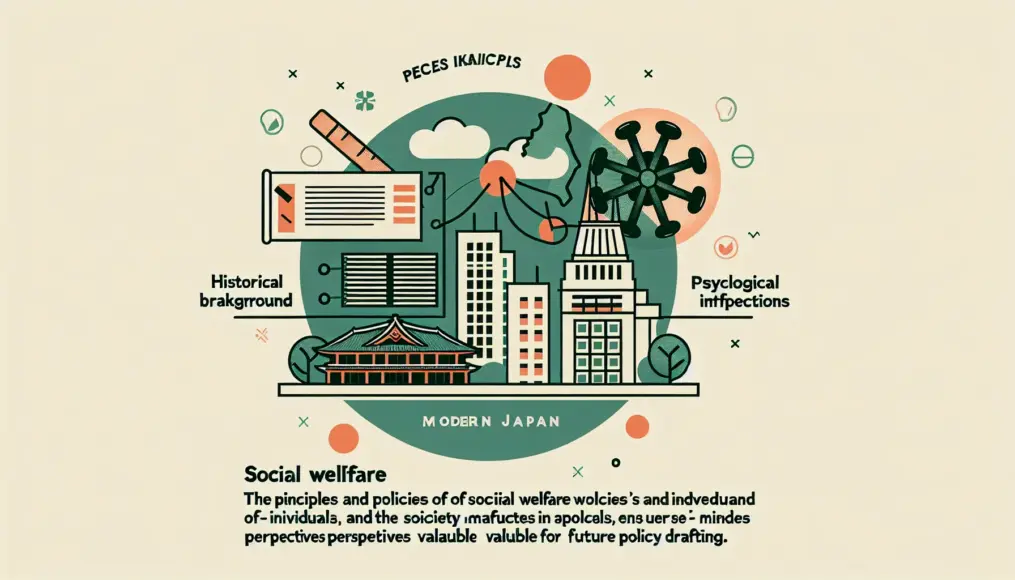Social welfare principles and policies are intricately woven into the fabric of our lives. It’s particularly important to consider how these welfare policies influence our mental well-being. By understanding the psychological impacts that policy changes can have on individuals and society as a whole, we can gather insights that may help us build a better community.
In this article, we will explore the historical background of social welfare policies, how modern welfare policies have evolved, and their effects on our mental states. Through this examination, we’ll also touch on the psychological changes that come with policy shifts and consider the future outlook for welfare policies.
Welfare policy is not merely a bureaucratic system; it significantly affects how we live and how we feel. Therefore, deepening our understanding of the principles and policies of social welfare is crucial.
- A look back at the historical background of social welfare policies
- An exploration of the psychological impacts of welfare policies on individuals and society
- Insights into the future of sustainable welfare policies
The Historical Background of Social Welfare Policy
Social welfare policy has played a crucial role in our society throughout history. In post-war Japan, particularly, welfare policies underwent significant changes alongside the nation’s economic recovery. During this period, various systems were established to ensure the stability of people’s lives, creating a framework to support the community. These policies have since evolved and continue to serve as the foundation for addressing various social issues today.
In this section, we will reflect on the evolution of welfare policies after World War II and consider how modern welfare policies have been shaped. By understanding the historical context, we may gain insight into the principles that underpin current policies and the outlook for the future.
The Evolution of Welfare Policy After World War II
In post-war Japan, numerous welfare policies were introduced with the aim of improving citizens’ lives. The Public Assistance Law was enacted in 1946, establishing a system to support those facing economic hardships. Additionally, from the 1950s to the 1960s, health insurance and pension systems were developed, strengthening the living standards of the populace.
These policies played a vital role in stabilizing society as part of the post-war recovery efforts. The expansion of welfare policies not only improved individual lives but also contributed to the overall development of society.
- In post-war Japan, systems like the Public Assistance Law were introduced.
- Health insurance and pension systems were established, strengthening the living standards of citizens.
- The expansion of welfare policies contributed to the stability of society as a whole.
The Formation of Modern Welfare Policy
Today, we face new challenges such as a declining birthrate and an aging population, which have required welfare policies to adapt. For instance, as there is an increasing demand for childcare support and enhanced services for the elderly, community-based assistance has become increasingly important.
Moreover, with advancements in technology, the methods of delivering welfare services have diversified. Online consultations and support have become available, allowing for broader access to services for more people. In response to these changes, welfare policies will likely continue to evolve.
If you’re interested in deepening your understanding of the relationship between the declining birthrate and social welfare policies, we recommend reading this article, “Considering the Economic and Social Impact of Declining Birth Rates.” This article provides a detailed analysis of the challenges Japan faces as birth rates decline and their impacts, so be sure to check it out.
- Modern welfare policies are responding to the challenges of declining birthrates and an unequal society.
- Community-based support has become increasingly emphasized.
- The evolution of technology has diversified the methods of delivering welfare services.
The Psychological Impact of Welfare Policies
Welfare policies do more than provide financial support; they also have significant psychological effects on individuals and society as a whole. Understanding how these policies influence people’s minds is crucial for evaluating their effectiveness. In this article, we will explore the changes welfare policies bring to individuals’ lives and the broader impact on society.
We will first examine the effects of these policies on individuals, followed by their psychological impact on society as a whole. By deepening our understanding of welfare policies, we may uncover insights that lead to a better society.
The Impact on Individuals
Welfare policies have a direct impact on people’s lives. For instance, well-implemented social assistance and healthcare systems can alleviate economic anxiety and foster a sense of security. With this kind of support, individuals can improve their quality of life, leading to enhanced self-esteem and overall happiness.
Conversely, inadequate welfare policies can lead to increased psychological stress. When support is inaccessible or the complexity of the systems makes it hard to utilize, individuals may feel a diminished sense of self-worth and isolation. Therefore, it’s essential to recognize how the quality of these policies significantly influences mental well-being.
- Welfare policies alleviate economic anxiety and foster a sense of security.
- Adequate support enhances self-esteem and overall happiness.
- Insufficient policies can lead to psychological stress.
The Psychological Impact on Society
Welfare policies affect not just individuals but society as a whole. In communities with robust welfare systems, there tends to be a heightened sense of mutual support and stronger social bonds. These connections foster a sense of security and solidarity, which further enhances the quality of life for everyone.
On the flip side, when welfare policies are inadequate, feelings of anxiety and dissatisfaction can permeate society. As disparities widen and the spirit of cooperation diminishes, societal division may increase, potentially leading to widespread unease. Thus, welfare policies are deeply intertwined with the psychological stability of society as a whole.
- Strong welfare systems enhance social bonds.
- They contribute to improving the quality of life for everyone.
- Insufficient policies can spread anxiety throughout society.
Psychological Changes Due to Policy Shifts
Welfare policies are often adjusted to meet the evolving needs of society and the times. These changes can significantly impact individuals and communities, making it essential to understand the resulting psychological shifts. Exploring how policy changes affect people’s lives and mental states can provide valuable insights for future policy-making.
In this section, we will analyze specific examples of policy changes and examine their psychological effects. Our goal is to evaluate these shifts from a psychological perspective and gather insights for improving policies.
Analysis of Policy Change Examples
Let’s consider a case where a region revises its welfare system. If the conditions for receiving support become more stringent, recipients may experience heightened financial anxiety. A reduction in economic assistance can lead to a decline in quality of life, potentially diminishing self-esteem and social connections.
On the other hand, if the welfare system is expanded, recipients are likely to feel more secure, promoting psychological stability. Thus, policy changes can have a direct impact on individuals’ lives, bringing about significant psychological transformations.
- Revising welfare policies can trigger financial anxiety
- Expanding support systems provides recipients with a sense of security and promotes psychological stability
- Policy changes directly influence individuals’ lives
Evaluating from a Psychological Perspective
The psychological impacts of policy changes extend beyond individual lives, affecting society as a whole. If a policy shift generates anxiety, it can lead to widespread dissatisfaction and stress within the community, weakening social bonds. Conversely, when policies are appropriately revised, there is potential for an increase in overall happiness and a strengthening of community ties.
By conducting such psychological evaluations, policymakers can better develop effective welfare strategies. Accurately understanding the effects of policy changes and identifying areas for improvement will be key to enhancing the quality of future welfare policies.
- Policy changes can create anxiety throughout society
- Appropriate policy modifications can enhance happiness and strengthen community ties
- Psychological evaluations serve as important guidelines for policymakers
Future Prospects for Welfare Policy
Welfare policy must evolve in response to changes in society and the needs of its people. In particular, implementing sustainable policies is essential for supporting future communities. Additionally, integrating psychological perspectives into policy-making is a crucial element for enhancing the well-being of individuals and communities. With these considerations in mind, let’s explore the future of welfare policies.
In this section, we will delve into what constitutes sustainable welfare policy, highlighting its characteristics and providing specific examples. We will also reflect on how to effectively incorporate psychological perspectives into policy-making, paving the way for a better society.
What is Sustainable Policy?
Sustainable welfare policy refers to policies that take into account economic, social, and environmental aspects. This means that support should not only focus on short-term solutions but also embrace a long-term vision. For instance, projects that encourage community independence or welfare services that are environmentally friendly are prime examples.
By focusing on sustainability, these policies are designed to benefit future generations, allowing more people to enjoy their advantages. This contributes to overall societal stability and is expected to enhance the happiness of individuals. Emphasizing sustainability makes welfare policies more effective.
- Sustainable policies require a long-term perspective in addition to short-term support.
- Projects that promote community independence are crucial.
- Overall societal stability and increased happiness are expected outcomes.
Incorporating Psychological Perspectives into Policy-Making
Integrating psychological perspectives into policy-making is vital for maximizing the effectiveness of welfare policies. By understanding people’s mental states and needs, we can implement measures that allow a greater number of individuals to benefit from these policies. For example, psychological support to encourage the utilization of welfare services or activities that strengthen community ties can be considered.
Moreover, it is essential to reflect the voices of beneficiaries in the implementation of policies. A commitment to gathering feedback is necessary to ensure that policies genuinely serve the needs of the people. By leveraging psychological perspectives, we can achieve a more human-centered approach to policy-making.
- By incorporating psychological perspectives, the effectiveness of policies can be maximized.
- It is important to reflect the voices of beneficiaries.
- Measures that promote a human-centered approach are needed.
Conclusion
In this article, we explored the principles and policies of social welfare through historical context, psychological impacts, and examples of policy changes. We discovered that welfare policies extend beyond mere financial support; they significantly influence both individual and societal psychological stability. The importance of sustainable policies and the need for incorporating psychological perspectives into policy-making have also become clear for the future of welfare initiatives.
Moving forward, it’s essential that welfare policies adapt to changes in the economy and society while prioritizing the mental health of individuals and the bonds within communities. To enhance the quality of these policies, it is crucial to reflect the voices of beneficiaries and consider psychological aspects in our approaches. This will lay the groundwork for building a better society.
- Social welfare policies can have a significant psychological impact.
- The importance of sustainable welfare policies is increasing.
- There is a demand for policy-making that incorporates psychological perspectives.
Let’s continue to pay attention to the trends in welfare policies and deepen our discussions toward realizing a better society. We would love to hear your thoughts and opinions!



Comment